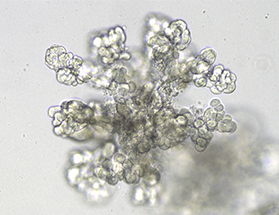
A joint UK and European research project launches today to combat liver cancer, which is the fastest rising cause of cancer death in the UK.
Liver cancer deaths have more than tripled in the UK since the 1970s. The disease is linked to smoking, infections, drinking too much alcohol, and being overweight or obese. Every year around 5,200 people die from liver cancer in the UK, and new data show that in Europe around 82,500 new cases of liver cancer are estimated to be diagnosed in 2018.
While prevention measures are critical for tackling this disease, more research is urgently needed to improve treatments and outcomes for patients. Liver cancer is one of the hardest cancers to treat, with only 11% of patients in Europe and 9% in England surviving their disease for 5 years or more.
To accelerate progress into liver cancer research, Newcastle University will be leading a project with around £5 million funding from Cancer Research UK and two of Europe’s leading cancer research charities. The award will establish a European and UK network of clinicians and scientists specialising in hepatocellular carcinoma (HCC) - the most common primary liver cancer in adults in the UK. The international team of experts includes two Cambridge liver cancer researchers - Dr Matt Hoare, a clinician scientist based at the CRUK Cambridge Institute and Dr Meri Huch, a Group Leader at The Gurdon Institute.
The researchers’ aim is to adapt immunotherapy treatments, which have shown an increase in survival in other cancer types, to treat HCC.
Professor Helen Reeves, lead investigator of the award at Newcastle University, said: “Immunotherapy treatments are starting to transform the way we treat cancers, but in liver cancer, early results suggest that these treatments only work in a small number of patients.
“Our team thinks there’s great potential for immunotherapy to treat many more liver cancer patients, but first we need to deepen our understanding of the ways in which the cancer switches off the immune system – so we can develop a number of strategies to switch it back on.
“For advanced disease – where survival is extremely poor, only several months for some patients – we don’t have very effective treatments. For the first time, there is the hope of offering treatments that for some add extra months or even years of life. Going forward, combinations of drugs including immunotherapies, may offer benefit and hope to patients that have had none before.”
The research team will lay the groundwork for a Europe and UK research pipeline to ensure basic biological research into liver cancer and the immune environment translates into finding new treatment combinations for preclinical testing.
The Cambridge researchers will obtain human organoids of the main subtypes of HCC which will allow them to test in the lab how the liver cancer cells interact with other cells in the liver, such as immune cells.
Dr Matt Hoare, clinician scientist at the CRUK Cambridge Institute said: “There is a pressing scientific need to understand how the diseased liver microenvironment and combined molecular cues determine HCC development and progression.”
As part of the grant, the next generation of early career scientists and clinicians will be trained, creating a critical mass of experts to carry this research forward.
Dr Iain Foulkes, Cancer Research UK’s executive director of research and innovation, said: “Over the last decade, liver cancer deaths have increased by over 50%. We haven’t seen the improvements in treatments that we have for other cancer types, so new, international research efforts like this provide hope that we can turn the tide against liver cancer.
“Cancer Research UK has made this investment to transform our understanding of the disease, in hope that it will lead to novel treatments for patients who currently have few options.”
Thomas Carpenter, 69, a liver cancer patient from Wickford, Essex said: “As someone with diabetes and cirrhosis, I had a high risk of developing liver cancer. I was being monitored at my local hospital, when one of the tests showed I had tumour markers in my blood, and I was referred onto the Royal Free Hospital in London where I was diagnosed with liver cancer. I wasn’t able to have surgery, so was put on sorafenib - the side effects of the treatment were pretty grim and my tumours continued to grow.
“I feel that being diagnosed with liver cancer has a reputation of being a death sentence, but in my case, I was lucky. I was honoured that I was able to join a cutting edge clinical trial for the immunotherapy drug, Nivolumab. Only a small proportion of patients respond to this treatment, so I’m one of the fortunate ones.
“Hearing about this investment is fantastic news, and I hope this will give a huge boost to our knowledge of liver cancer and help save more lives.”
This award of around £5 million is one of 6 research projects to receive funding from Cancer Research UK’s Accelerator Awards programme – a funding scheme designed to speed up progress in translational research through collaborations across the UK and in Europe.















